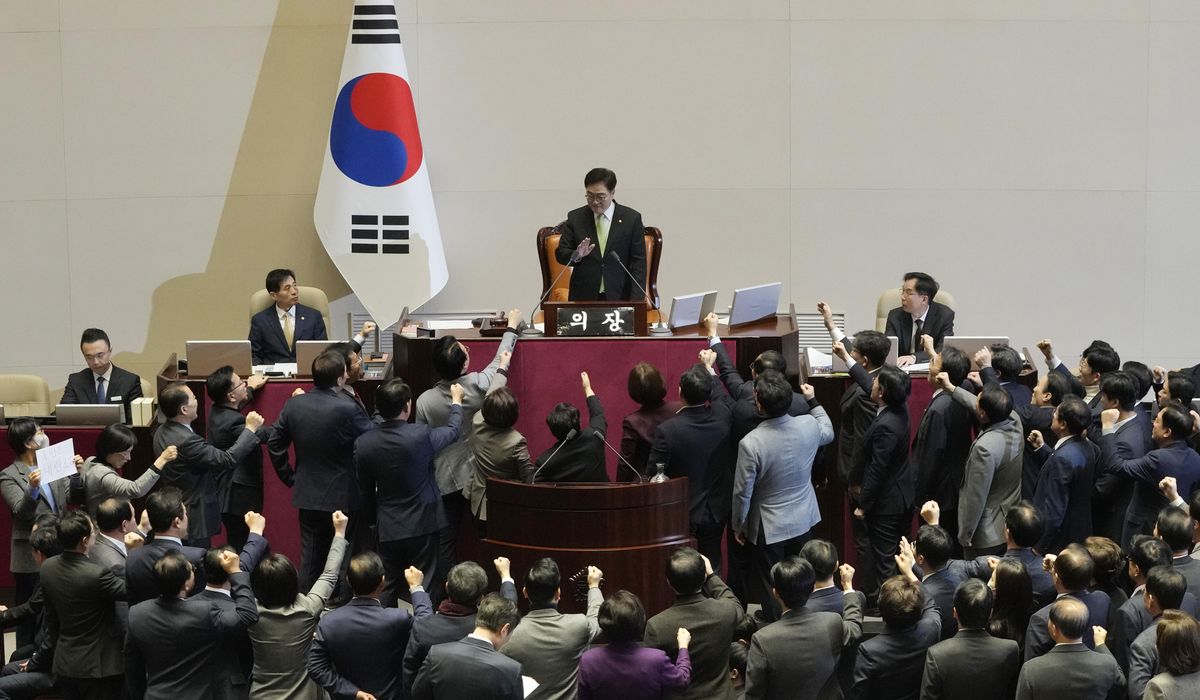


SEOUL, South Korea — South Korea’s opposition-controlled National Assembly voted on Friday to impeach acting President Han Duck-soo, just 13 days after impeaching President Yoon Suk Yeol.
Following Mr. Han’s dismissal, Deputy Prime Minister and Finance Minister Choi Sang-mok is expected to be the third man to take South Korea’s national helm in less than a month.
Though the country comfortably managed two presidential impeachments in 2004 and 2016, in neither prior case was the acting president also booted. This means a key U.S. Indo-Pacific ally and pivotal node in global supply chains is sailing into uncharted political waters.
Since democracy was fully established in South Korea in 1987, power has been split between the executive and legislative branches.
Friday’s development suggests that, for the near future at least, the right-leaning presidency is at the mercy of the National Assembly, controlled by the left-leaning Democratic Party of Korea.
Despite widespread demonstrations, there is no apparent social chaos, but there are economic strains and diplomatic challenges.
The national currency, the won, is trading at 15-year lows, causing problems for Korean businesses, travelers and overseas residents.
And with the presidency disempowered — possibly for eight months or longer — Cabinet officials lack the mandate to establish links with figures in U.S. President-elect Donald Trump’s administration in Washington.
President booted, acting president booted
Formerly the prime minister, Mr. Han was an appointee of Mr. Yoon. Mr. Yoon astounded the nation when, citing anti-state forces and parliamentary obstructionism, he declared martial law late on Dec. 3.
Amid public rage, his decree was nullified within three hours by a countervote at the National Assembly.
Mr. Yoon was impeached on Dec. 14. Twelve members of his own People Power Party joined opposition lawmakers, generating the two-thirds majority vote needed for a presidential impeachment.
Mr. Yoon’s powers were suspended. He is not communicating, appearing or responding to police summonses.
Per constitutional protocols, Mr. Han, an experienced political operator who has worked for both left and right-wing administrations, took power seamlessly. However, the DPK warned Mr. Han on Tuesday that it would impeach him if he used the presidential veto to nullify bills promoted by the party and if he refused to sign off on the appointment of three Constitutional Court judges.
Mr. Han ignored those warnings. On Friday, a noisy House plenary was held.
The speaker criticized Mr. Han of slow-walking the judicial appointments and ruled that a simple majority was needed to impeach an acting president, rather than the two-thirds majority needed to impeach an elected president.
Furious, the PPP boycotted the vote, granting main and minor opposition parties a free run. They voted to impeach Mr. Han, 192-0.
The lop-sided political situation will not rebalance in the near future.
The Constitutional Court, tasked with judging Mr. Yoon’s impeachment, has six months to decide. If it votes to uphold it, a presidential election must be held within two months.
The court has yet to sit. Its bench accommodates nine judges, but only six seats are filled. Three are empty after their occupants’ terms expired.
A vote of at least six is required to uphold an impeachment. In its current state, it would have to vote unanimously to boot Mr. Yoon.
The appointments to fill the three seats became a tug-of-war in the Assembly. The president is tasked with signing off on the appointments, and Mr. Han refused to do so unless the governing and opposition parties agreed on them, which they had not.
The Assembly on Friday approved three judges. Their appointments must be agreed upon by the incoming acting president, Mr. Choi, whose stance on the matter is unclear.
Uncharted waters
Observers are unsure what to make of affairs. One, who has been watching Korea since democratization, revealed the extreme positions adopted by current players.
Another expressed concern at politics, but suggested that public discontent with economic woes will pressure the political and judicial sectors to move swiftly.
“There seems to be a systemic issue where everybody is overreaching,” said Mike Breen, author of “The New Koreans.” “Yoon himself deserved to be impeached for martial law, but the opposition have now wrecked the system.”
He added: “The opposition party has thought since April that they had a mandate to rule — which is why the president lost it with martial law — and that is what they are doing now.”
Mr. Yoon’s PPP suffered a crushing defeat in the April National Assembly elections, though the DPK failed to gain an overall majority.
Subsequently, the DPK voted to impeach a number of Mr. Yoon’s appointees — an exercise of power criticized by both Mr. Yoon and Mr. Han — and shot down major budget proposals.
The DPK has also been pushing repeatedly to investigate Mr. Yoon’s wife, widely accused of corruption and interference in appointments. Mr. Yoon vetoed these proposals.
Another observer expressed concern at the political situation, but suggested public discontent with economic woes will compel both political and judicial sectors to move swiftly.
“The opposition now has whole power over the Assembly and the Executive branch: that’s what it is, right now,” said Yang Sun-mook, who formerly advised the DPK international affairs. “But the general public are more concerned about the downturn, as we are getting into deeper s—- economically.”
Post-impeachment, the DPK mood was triumphalist.
A note sent from the International Committee of the DPK to foreign reporters, addressing Mr. Han, reads, in part: “After playing Acting President for a few days, did you start to feel like you were actually elected to the role? Watching you cling to your position, twisting yourself in knots to dodge responsibility, almost inspires pity. Almost. But let’s face it. You are not qualified to act as Acting President.”
• Andrew Salmon can be reached at asalmon@washingtontimes.com.
